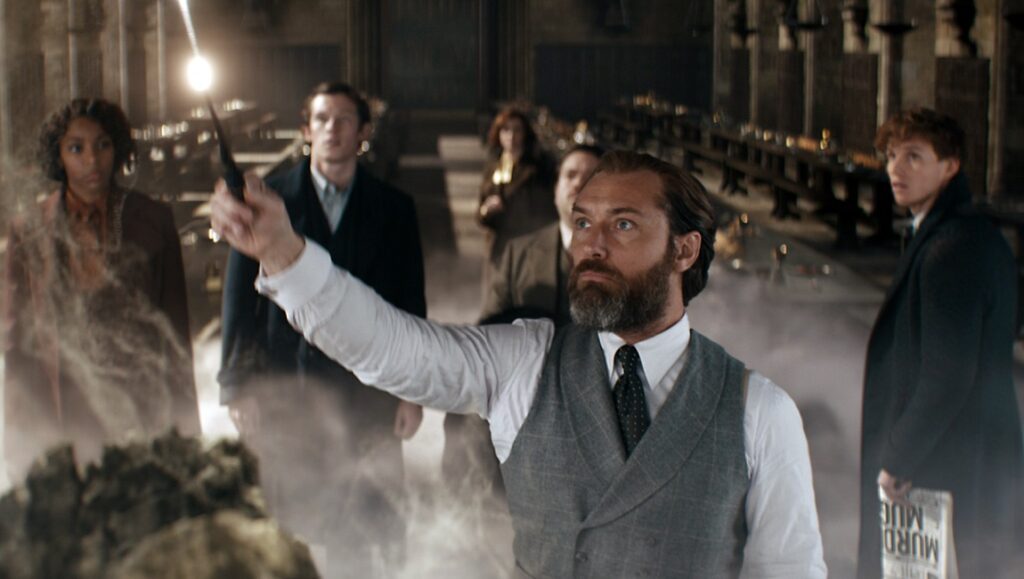The Secret of Dumbledore is yet another bloated franchise entry that further flattens the Wizarding World’s profoundly diminished appeal.
It’s 2022 and whatever magic a new Wizarding World installment could once conjure has surely dried up. The extended film franchise is the fourth-highest grossing of all time, yet fails to command pop cultural relevance comparable to its IP-abundant peers. A theory: since the modern Marvel Studios superhero blockbuster unilaterally determined the form and function of a smash-hit, competing brands in search of similar success have often cribbed from Marvel’s best practices. The end products are $200 million Avengers-esque derivatives, with bloated casts, bloated runtimes, CGI-laden spectacle, and ridiculously convoluted plotting that simulates an audiovisual rollercoaster ride. As these imitators lack the Marvel-patented formula of charm, humor, and careful character work, they at best achieve only pleasant mediocrity. The Fantastic Beasts series was always intended to be “at least” a trilogy, with potentially five in the works overall. This newest film, The Secrets of Dumbledore, checks in as little more than a disposable chunk of content dutifully fulfilling that studio executive vision.
Things start off with Newt Scamander (Eddie Redmayne) in Kweilin, China, helping a magical creature called a Qilin give birth. Credence Barebone (Ezra Miller), revealed at the end of the previous entry to truly be Aurelius Dumbledore, shows up with some of Gellert Grindelwald’s dark followers. They overpower Newt, dispatch the mother, and escape with the newborn Qilin. Grindelwald (now Mads Mikkelsen) kills the infant creature and accesses its precognitive powers. All is not lost, however, as Newt discovers the mother birthed twins. He’s soon recruited by Albus Dumbledore (Jude Law) to be part of a ragtag gang tasked with saving the magic and Muggle worlds from Grindelwald’s machinations.
It’s a mostly bumbling affair from then on. Director David Yates packs this globe-trotting adventure with the sharp, period-appropriate styling, attempts at comedy, quick cut and slow-motion YA fantasy-action violence, and nostalgic money shots of intertextual gems one would expect out of this thing. In other words, everything on the checklist. Clearly absent, however, is any sort of stakes or drama. Characters don’t really have conflicts, merely obstacles that will undoubtedly be circumnavigated later on — so it goes in a good-beats-evil tale. But in this particular 142-minute good-beats-evil tale, expect a whole bunch of contrivances to set the heroes back as the villain proceeds through the plot uninhibited while doing nothing interesting (that Mikkelsen’s character feels like a knock-off fusion of two other Mikkelsen performances — Kaecilius from 2016’s Doctor Strange and Hannibal Lecter — greatly undermines his sense of threat). There isn’t even a true protagonist to invest in, as a MacGuffin sidelines Dumbledore until the third act, and Newt gets relegated to a side quest for much of the second half to ensure the “Fantastic Beasts” portion of the title reads like a bit less of a misnomer than it clearly is. The rest of the ensemble have their fun, but with so many two-dimensional characters hanging around with some functional relevance to the plot, there is no engaging thread to follow, but rather only a messy latticework the viewer is apparated across in hopes the rotating faces make them forget how dull the whole enterprise is.
Very apparent as well is J. K. Rowling’s bedeviled attempts to mine any sort of freshness out of topicality. A co-writer on the film, the controversial creative has long caught flak from fans for retroactively adding character or universe details not present in her original text in hopes of scoring some clout. The Secrets of Dumbledore ham-fistedly traffics in disinformation discourse. Grindelwald is a fearmongering Hitler expy, spouting off about the purported division and conspiracy in the magic world as he effectively leads a bloodless putsch on the German Ministry of Magic and scapegoats Muggles. His ultimate plan aims to undermine democracy through manipulation of an ancient tradition. To make matters worse, the film doesn’t even say much about Grindelwald’s fascistic leanings beyond “bad guy does bad things,” which is a missed opportunity. If the intention was to give the CNN-subscribed parents a little mental gristle to chew on while the kids soak up the tired “have a heart” and “try even when things aren’t perfect” messaging, then mission accomplished.
Once a quirky departure from Harry Potter’s coming-of-age mega epic, Fantastic Beasts has firmly slid into run-of-the-mill “event” picture territory. All its wit and verve are studio-sanitized. What should be a more character-driven story instead is a narrative diversion into mildly fascinating lore, encumbered by unearned import and reverse-engineered to resemble a superior model. With Doctor Strange now holding the belt for cinema sorcerer supreme, the Harry Potter world doesn’t even have a monopoly on magic in movies anymore. God forbid some sort of Wizard World multiverse is in the cards next. All this latest entry certifies is that avid and casual fans alike will surely be wishing to return to better times.


Comments are closed.